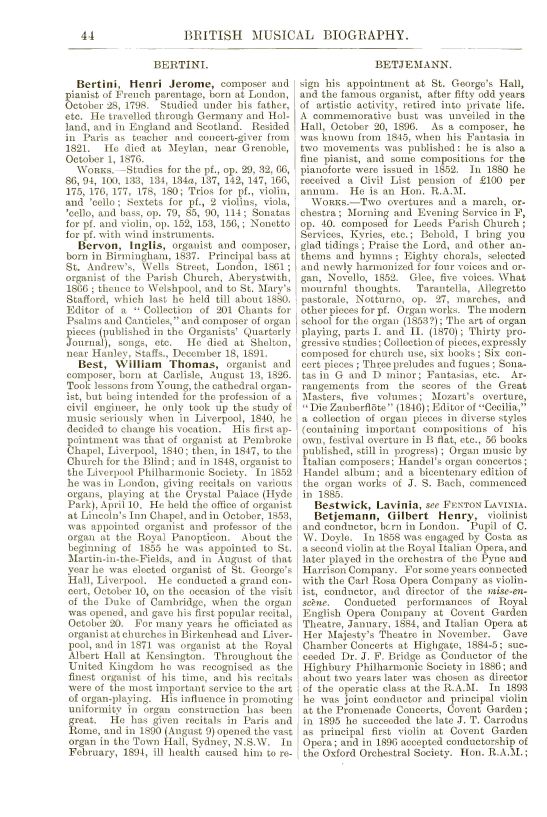- Best, William Thomas
[E] Best, William Thomas, organist and
composer, born at Carlisle, August 13, 1826.
Took lessons from Young, the cathedral organ-
ist, but being intended for the profession of a
civil engineer, he only took up the study of
music seriously when in Liverpool, 1840, he
decided to change his vocation. His first ap-
pointment was that of organist at Pembroke
Chapel, Liverpool, 1840 ; then, in 1847, to the
Church for the Blind; and in 1848, organist to
the Liverpool Philharnionic Society. In 1852
he was in London, giving recitals on various
organs, playing at the Crystal Palace (Hyde
Park), April 10. He held the office of organist
at Lincoln's Inn Chapel, and in October, 1853,
was appointed organist and professor of the
organ at the Royal Panopticon. About the
beginning of 1855 he was appointed to St.
Martin-in-the-Fields, and in August of that
year he was elected organist of St. George's
Hall, Liverpool. He conducted a grand con-
cert, October 10, on the occasion of the visit
of the Duke of Cambridge, when the organ
was opened, and gave his first popular recital,
October 20. For many years he officiated as
organist at churches in Birkenhead and Liver-
pool, and in 1871 was organist at the Royal
Albert Hall at Kensington. Throughout the
United Kingdom he was recogi^ised as the
finest organist of his time, and his recitals
were of the most important service to the art
of organ-playing. His influence in promoting
uniformity in organ construction has been
great. He has given recitals in Paris and
Rome, and in 1890 (August 9) opened the vast
organ in the Town Hall, Sydney, N.S.W. In
February, 1894, ill health caused him to re-
sign his appointment at St. George's Hall,
and the famous organist, after fifty odd years
of artistic activity, retired into private life.
A commemorative bust was unveiled in the
Hall, October 20, 1896. As a composer, he
was known from 1845, when his Fantasia in
two movements was published : he is also a
fine pianist, and some conapositions for the
pianoforte were issued in 1852. In 1880 he
received a Civil List pension of £100 per
annum. He is an Hon. R.A.M.[W] Works. — Two overtures and a march, or-
chestra ; Morning and Evening Service in F,
op. 40. composed for Leeds Parish Church ;
Services, Kyries, etc. ; Behold, I bring you
glad tidings ; Praise the Lord, and other an-
thems and hynms ; Eighty chorals, selected
and newly harmonized for four voices and or-
gan, Novello, 1852. Glee, five voices. What
mournful thoughts. Tarantella, Allegretto
pastorale, Notturno, op. 27, marches, and
other pieces for pf . Organ works. The modern
school for the organ (1853?) ; The art of organ
playing, parts I. and II. (1870) ; Thirty pro-
gressive studies ; Collection of pieces, expressly
composed for church use, six books ; Six con-
cert pieces ; Three preludes and fugues ; Sona-
tas in G and D minor ; Fantasias, etc. Ar-
rangements from the scores of the Great
Masters, five volumes ; Mozart's overture,
" Die Zauberflote" (1846) ; Editor of "Cecilia,"
a collection of organ pieces in diverse styles
(containing important compositions of his
own, festival overture in B flat, etc., 56 books
published, still in progress) ; Organ music by
Italian composers; Handel's organ concertos;
Handel album ; and a bicentenary edition of
the organ works of J. S. Bach, commenced
in 1885.entry id: 44-L-27

page 44 - view at internet archive
